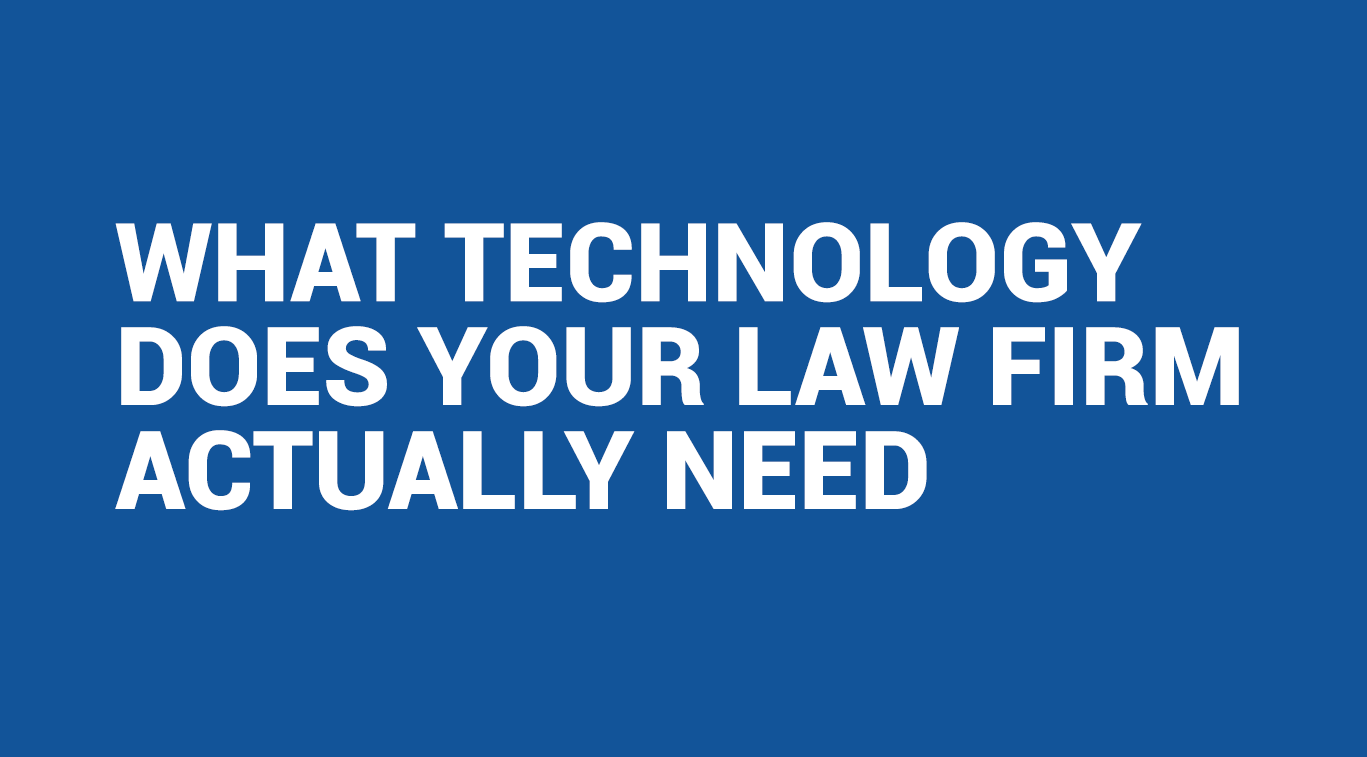What Technology Does Your Law Firm Actually Need

Written by Maryam Khan
Blogger

As per a recent survey conducted by Bloomberg, it was reported by 90% of attorneys that incorporating legal technology solutions into their operations improved their services to a great extent [1]. Many law firms now firmly believe that using the correct legal technology acts as a great equalizer, enabling them to operate more effectively, providing higher customer satisfaction by meeting client expectations, aiding in case research swiftly, and sustaining performance that is on par with that of larger firms. Employees may also be able to work remotely with flexible hours as a result of incorporating legal technology.
If you want to improve the efficiency of your legal practice, you must first move from cumbersome spreadsheets, handwritten notes, and reams of paper towards more effective solutions. Below mentioned are a few softwares and solutions that are recommended by most attorneys. These legal technology solutions will keep your law business operating like a well-oiled legal machine.
Practice Management Systems
Legal technology is incomplete without mentioning Practice Management Systems. This software aids law firms to run their daily business operations and workflows more efficiently. A law firm may incorporate Practice Management Systems to handle its cases, clients, calendars, documents, tasks, time tracking, billing, payments, accounting, and many more operations.
By using practice management systems, one can keep all of the company’s data in one safe place. As a result, there is better information access and support for better coordination across a broader range of duties in the workplace. Employees do not waste their time by looking up information because they always have access to the most recent case in hand and client information.
Administrative activities within a law firm are also streamlined using technology, and are handled more accurately with the correct practice management software, ensuring that nothing is overlooked. All administrative tasks inside a law firm can be made more accessible to accomplish and track with the help of this kind of legal technology.
Legal Billing Software
The billing requirements for law firms are notably different, if not complex [2]. Even individual practitioners and small firms must handle a variety of rates and billing methods, track and allocate hours to clients, and maintain timesheets. With cloud-based solutions, you can keep up with how you work while tracking hours and managing cases from any location with the assistance of legal billing solutions. e-Billing replaces the conventional billing approach in which lawyers get paper bills from their law firms via email or regular mail. Legal teams can now compile reports without having to manually insert line items into spreadsheets or go through mountains of paper bills. e-Billing’s improved visibility makes it easier to keep track of expenditures. There are several benefits of using e-Billing software and legal spend management tools that include lower costs, efficiency, ease of use, and key metric reportings [3].
Document Management Software
Document management software is not just limited to an increased storage, however, Storage is only one aspect of document management. Law firms’ document management systems keep all files, emails, and documents pertaining to a client and case in one location. This greatly simplifies the retrieval and referencing of documents when compared to the convoluted folder structures found in services like Dropbox. Document management software solutions allow lawyers to perform text based search, by searching documents through a word search to find exactly what they need within a couple of seconds.
Document management systems interact with the technologies a law firm already uses to make things more convenient. Lawyers can swiftly automate repetitive processes like generating letters, agreements, invoices, email reminders, appointment confirmations, etc. by using document and email templates, which will save them a tremendous amount of time on low-value, and non-billable administrative tasks [4].
E-Signature Software
E-Signatures work through the public key cryptography of two mutually authenticating cryptographic keys. Data connected to the digital signature is encrypted using a private key by the person who makes it, and can only be decrypted using the signatory’s public key [5]. Using an e-signature technology reduces bottlenecks and manual chores, by improving efficiency and the overall experience. It enables users to track who has viewed, signed, or authorized a digital document, add a legally binding signature fast from any location using any device, and maintain a comprehensive paper trail without using any actual paper.
Video Conferencing Software
By using video conferencing softwares, the legal industry has been enhanced as virtual meetings are now made possible. Enabling and using these video conferencing softwares have saved time and money for lawyers as well as clients. A video conferencing programme can be used for training in addition to communication. Law firms can give their personnel proper training irrespective of whether they are managing a small or a large scale law firm [6].
Moreover, regardless of the distance between law firms and their clients, attorneys can complete transactions, speak with witnesses, and take depositions from anywhere in the world. Face-to-face encounters still have a lot of importance in the legal world where civility, presentation, and grooming are prioritized. However, since this is 2022, Face-to-face meetings don’t always require participants to be present in the same space.
Cloud Storage
Cloud storage has been recommended and preferred by companies all around the world consistently over time. The cloud is perceived by attorneys and law firms as a quick and scalable solution to access cutting-edge legal technology tools without having to make a substantial initial capital investment in software.
Important data is stored on hardware in a distant physical location that is accessible from any device via the internet when using cloud storage. Instead of (or in addition to) keeping files on their own hard drives, clients send files to a data server operated by a cloud provider. Cloud-based solutions are an integral part of law firms and their operations and their importance continues to increase in the legal sector [7].
Client Management Software
Since lawyers have to keep track of client activity, cases, bills, files, etc., turning to law firm client management systems can be highly beneficial for them, as they are crucial in creating high-quality information that everyone in the firm can use. A solution referred to as a law firm’s client management software keeps track of every interaction a law firm has with its clients. To create and maintain client relationships and obtain required information, lawyers and other legal professionals frequently consult data in the client management software. Client management systems provide law firms and in-house legal teams with organized processes and readily available information, enabling them to make choices confidently. A strong structure like this encourages business development activities, raising law firm revenues [8].
Final Words
The above mentioned software solutions can assist law firm’s in choosing the right legal technology software without being overwhelmed with what the legal technology market has to offer. Now, more than ever, technology is now the driving force behind the legal sector making legal technology an adoption for most future-facing law firms.
References:
[1] ‘Lawyers’ Top Legal Tech Tools—And Biggest Blind Spots’, Bloomberg Law (2022) at https://news.bloomberglaw.com/bloomberg-law-analysis/analysis-lawyers-top-legal-tech-tools-and-biggest-blind-spots
[2] Dana Miranda, ‘The Best Legal Billing Software Of 2022’ (2022) at https://www.forbes.com/advisor/business/software/best-legal-billing-software/
[3] ‘Legal e-Billing’ 2022 at https://www.simplelegal.com/legal-ebilling
[4] ‘6 ways cloud document management can transform your law firm’ (2017) at https://www.wolterskluwer.com/en-gb/expert-insights/cloud-document-management-law-firm
[5] Ben Lutkewich, ‘Digital Signature’ at https://www.techtarget.com/searchsecurity/definition/digital-signature
[7] ‘The Complete Guide to Law Firm Cloud Storage’ at https://www.apexchat.com/blog/the-complete-guide-to-law-firm-cloud-storage/
[8] ‘Guide to Choosing the Ultimate Law Client Management Software’ at https://www.app4legal.com/your-guide-to-choosing-the-ultimate-law-firm-client-management-software-crm/








